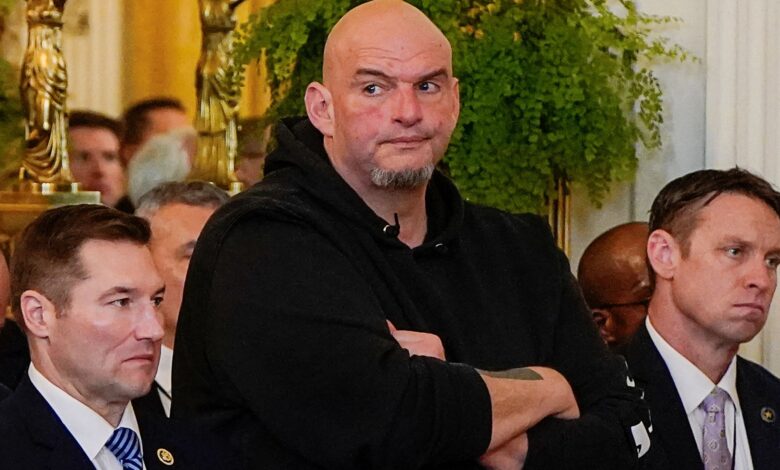Democrats’ new party leader won’t be able to right the ship

Saturday’s election of a new Democratic National Committee chair is attracting a lot of media attention in the wake of the drubbing the party received in 2024.
A fresh start under a new leader could help turn the floundering Democrats’ fortunes around, insiders fervently hope.
But that’s not likely, whoever wins the battle — be it Wisconsin state chair Ben Wikler, Minnesota state chair Ken Martin or one of their long-shot rivals — because the party’s problems are ideological, not technical.
The DNC, like its Republican counterpart, sounds more important than it is. It does not select candidates for office, establish the party’s platform or set legislative priorities at any level of government.
The national committee isn’t even the leading campaign-fundraising entity in presidential, federal or state races.
While the DNC raised an impressive $652 million during the 2024 campaign cycle, the Kamala Harris campaign alone raised over $1 billion.
The race for DNC chair could matter if the party’s woes were purely a matter of campaign mechanics: The central party helps to maintain voter-contact databases and provides technological infrastructure that all its candidates can access.
If the Democrats’ November defeats were due to poorly maintained databases or outdated voter modeling software, the new chair could fix those and propel the party to victory.
That, however, is clearly not the case: Democrats are losing because of their message, not their tactics or techniques.
Consider these facts:
- The Gallup Organization’s annual polling found that more Americans have identified as or leaned toward Republicans for three straight years, the first time that has happened in the company’s history.
- This movement is historic. Democrats led in party identification in nearly every year since the 1930s.
- The 2024 FOX News/AP post-election voter survey found 49% of the electorate identified as or leaned Republican, compared to 44% identifying as or leaning Democrat. It was the first presidential election in the history of exit polling in which Republicans outnumbered Democrats.
- Harris won 95% of Democrats and beat Trump by 6 percentage points among pure independents. She would have won every other presidential election conducted since 1932 with these numbers.
And the Democrats’ woes have only deepened since last November. President Trump started his second term with a positive net job-approval rating, something he was never able to achieve in his first term.
The Democrats’ long-term decline in voter registration has continued, too. Registered Republicans now outnumber Democrats in Nevada for the first time since 2007, and the GOP is also continuing to out-register Democrats in key states such as Pennsylvania and North Carolina.
A recent Quinnipiac University poll reinforced the drumbeat of bad news. It found only 31% of respondents had a favorable opinion of the Democratic Party, the lowest number ever in that poll’s history.
Republicans, in contrast, had their highest-ever favorable rating in that same poll (43%).
The message is the same everywhere you look: Democrats are at their lowest level of public support and favorability in nearly a century.
A new party chair cannot turn such a precipitous decline around. That is the job of elected Democrats.
A few of those are beginning to speak up. Pennsylvania Sen. John Fetterman, for example, has met with Trump and criticized many of his party’s left-wing stances.
New York Rep. Ritchie Torres has also lashed out at some of his party’s excesses.
But so far theirs are lonely voices of moderation in a large party that remains far to the left of the American electorate.
The party’s challenge is best depicted in the Senate’s recent vote on the Laken Riley Act, a no-brainer bill mandating the detention of illegal immigrant criminals.
Just 12 Senate Democrats broke party lines to join all Republicans in backing the measure.
It’s notable, though, who those 12 were: nine of the 10 Senate Democrats representing states that Trump carried; both senators from New Hampshire, which Trump lost by less than three percentage points; and Virginia’s Mark Warner, who may be facing a challenge from popular term-limited Republican Gov. Glenn Youngkin in 2026.
Every other Senate Democrat voted no.
They represent the party’s base, the people who will select the next Democratic presidential nominee — and they know the base remains committed to the sort of open-borders policies that helped cause the party’s decline.
Whoever prevails this weekend can’t fix that. All that person can do is rearrange the deck chairs on the S.S. Democrat.
It will fall to the ship’s elected captains to determine if it comes home safely to port — or if it runs full-throttle into the iceberg of increasingly conservative public opinion.
Henry Olsen, a political analyst and commentator, is a senior fellow at the Ethics and Public Policy Center.




